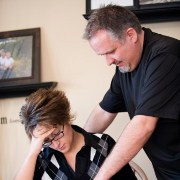
April is Sexual Assault Awareness Month, and in my last two articles, I tried to provide some very small insight into the scope of this issue and its impact on women and communities. However, statistics and definitions only go so far in helping to identify what is truly a dangerous situation or unhealthy relationship. This article will list some of the signs of an abusive relationship. If you or someone you know has experienced any of these feelings, take action! You have options and several different ways to get help. It is never a woman’s fault if she is being abused, whether physically or emotionally. Even if you are in a committed relationship you can still be a victim of sexual assault, and even if you are a smart, confident, empowered woman, you can still find yourself in unhealthy circumstances.
Unfortunately, abusive relationships are not always easy to identify, as abusers use coercion, manipulation and lies to cover their injurious words and deeds. Familiarizing yourself with symptoms of a dangerous situation can help prevent the horrifying physical and emotional consequences of domestic violence.
1. According to www.helpguide.org, the most telling sign that you are in an abusive relationship is a fear of your partner. If you are constantly worried about disappointing, of “doing something wrong”, of making a partner angry, or of bringing up a topic that will lead to an argument, among other things, this may be an indication that something is seriously amiss in your relationship. You have the right to feel safe and confident in your own home.
2. An abusive partner often belittles the victim, whether by humiliating or criticizing her, ignoring accomplishments and opinions, blaming the victim for abusive behavior or treating him/her as an object. If your partner makes you feel embarrassed for the way you think, feel or behave on a regular basis, this may be an indication that your relationship has elements of abuse. You have the right to believe, speak and act in the way you choose, without being embarrassed.
3. An abuser may control or limit your contact with other friends and family, your access to money or private savings, may prevent you from going certain places without “supervision” or act extremely possessive or jealous. If you feel trapped or unable to reach out to anyone outside of your home, this can be an indication that your partner has abusive tendencies. You have the right to maintain control over your own communication, finances and daily activity.
4. A partner can use violence, withholding of basic necessities, intimidation and forced sexual activity to abuse his/her partner, and even simple threats of this sort of behavior is considered dangerous and abusive. If your partner has ever threatened to commit suicide, to hurt you or your loved ones, to destroy your belongings or file false accusations to the police, this is abuse. Even if it only happens once. Even if he/she claims they were “kidding,” even if he/she never acts upon their threat. You have the right to live your life free of manipulation and threats.
5. Sometimes, a victim feels helpless, emotionally numb, crazy, guilty or as if he/she deserves to be “punished”. These feelings are not part of a healthy, equal partnership based on mutual respect. You are strong, unique, intelligent, beautiful, capable, independent and perfect just the way you are. No one should tell you otherwise.
Below are a few resources to contact if you believe you or someone you know is a victim of an abusive relationship, or even if you just have questions about possible services, situations or statistics. Be a part of the fight against domestic violence and sexual assault by helping to raise awareness. Know the signs of abuse and know that you are not alone. Feel free to contact me with a personal message if you would like more information about violence against women or ways to prevent it.
www.helpguide.org/mental/domestic_violence_abuse_types_signs_causes_effects.htm (Main source for this article with many additional resource links)
National Domestic Violence Hotline: 1-800-799-SAFE (7233)
National Sexual Violence Resource Center: 1-877-739-3895 (tollfree); www.nsvrc.org
Rape Abuse and Incest National Network: 1-800-656-HOPE (4613); www.rainn.org





Add a Comment2 Comments
you know, this is a good article. however it's not always the women who's being abused. I'm very upset that this article did not take into the fact that many men also live in an abusive relationship, I am one of those men. Get rid of the biased side of the article and it'd be perfect. You really should have named this site just plain old EMPOWER for everyone instead of trying to be hip, trendy or clever or siding with a gender.
April 26, 2011 - 7:20amThis Comment
Dear Anonymous,
Thank you so much for your comment - you are absolutely right. This article focuses only on women who are in abusive or unhealthy relationships. There are many, MANY men and transgender people who also experience domestic violence and sexual assault, and it takes brave people like you to remind our very gender normative society that this is true.
I hope you are getting the support that you need to feel safe. Please let me know if I can be a resource for anything, or provide you with any information.
Very best,
April 26, 2011 - 12:00pmHannah
This Comment